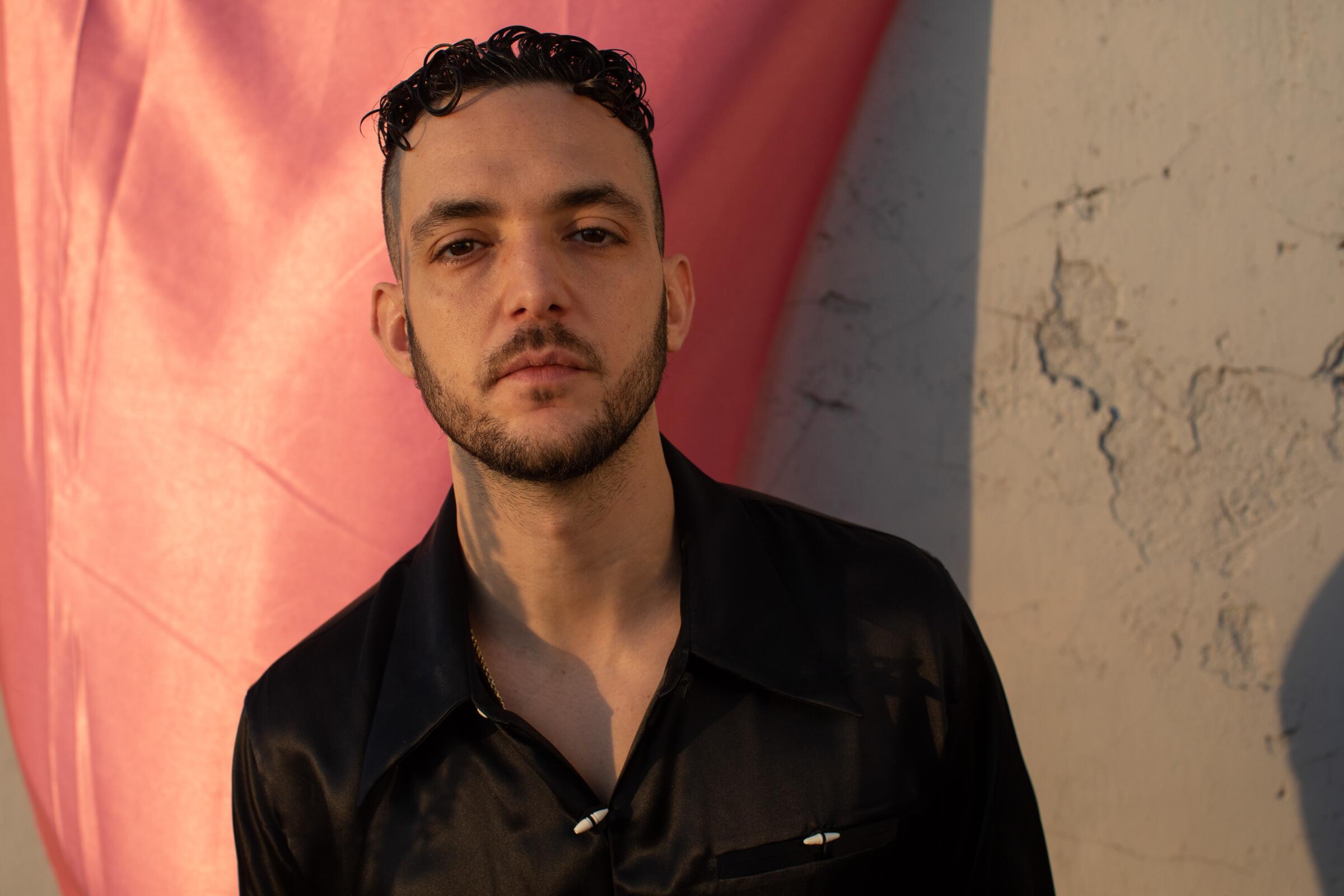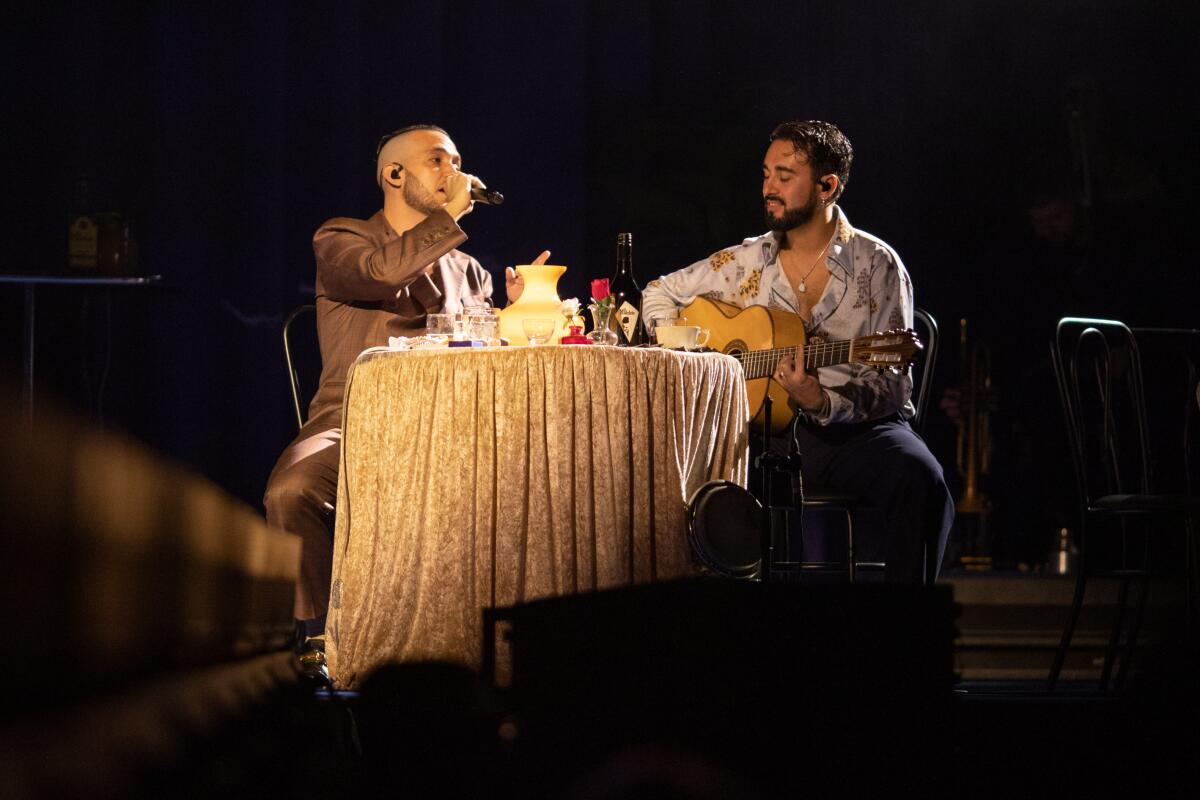The biggest entertainment stories
Get our big stories about Hollywood, film, television, music, arts, culture and more right in your inbox as soon as they publish.
You may occasionally receive promotional content from the Los Angeles Times.

MEXICO CITY — A spotlight fell in the darkened concert arena on a long table strewn with drinks, ashtrays and dinner plates, as if a leisurely meal had just taken place.
Sitting around it were a dozen musicians and Antón Álvarez Alfaro, the Spanish singer known as C. Tangana, who was holding court in a pin-striped, double-breasted suit.
Once known as a flashy rapper on the Latin trap scene, Álvarez, 32, has reinvented himself in recent years, creating a rich sonic universe that blends traditional Spanish, Latin American and Caribbean sounds with contemporary pop production.
After leading the crew in a rousing flamenco about an “ungovernable” female lover — driving the rhythm with furious hand claps — Álvarez slowed things down. As guitarists plucked the tune of “Sabor a Mí,” a classic Mexican bolero, he began to sing, his voice transformed through a vocoder to eerie and achingly modern effect. The crowd of several thousand was transfixed.

Álvarez is part of a new class of pop musicians looking to traditional genres for inspiration.
Think Bad Bunny, who performed his merengue hit “Después de la Playa” at the Grammys this year, or the bachata and flamenco-tinged tunes of Rosalía, whom Álvarez dated and has worked with.
“El Madrileño,” his acclaimed 2021 album, veers lithely between global genres — bossa nova one moment, salsa, Mexican norteña or Brazilian baile funk the next.
It includes collaborations with more than a dozen Spanish-language musicians, from legends like the Gipsy Kings and Eliades Ochoa, of Buena Vista Social club fame, to up-and-coming stars like R&B crooner Omar Apollo and indie rocker Ed Maverick. The album won three Latin Grammys and was Spain’s best-selling album in 2021.
In the year since Grupo Frontera’s inception, the McAllen, Texas, players have made enormous strides — not just for themselves but for the regional Mexican genre.
Álvarez hasn’t completely abandoned his rap persona. Many of his recent hits pivot at some point to trap, and this week he is reissuing his classic 2018 mixtape “Avida Dollars” with a brand-new song.
That dizzying blend of old and new has made Álvarez one of the most in-demand acts in Latin America, even as he fends off occasional critiques of machismo and cultural appropriation.
Álvarez describes his current approach to music and the album that changed everything as “a love letter from Spain to Latin America.”
His longtime producer, Alizzz, calls it as an “epic journey” of deconstruction.
The truth is, it almost didn’t happen at all.

The day before he took the stage for the first of two sold-out shows in Mexico City late last year, Álvarez rose after noon, strode through the sunny courtyard of his posh hotel and ordered an espresso poolside.
Álvarez is compact and chiseled, and carries himself, chin up, like a boxer entering the ring. Shadows beneath his eyes hinted at the toll of a year of near-constant touring and partying.
At the prodding of his manager, Álvarez begrudgingly recorded a few promo videos for his upcoming shows, then he leaned back, sipped his coffee and started talking.
Born in Madrid to a middle-class family, Álvarez released his first songs while still a student at a Catholic high school. A devotee of the Beastie Boys and Kanye West, he quickly became a mainstay of Spain’s underground hip-hop scene, working at a fas- food restaurant and a call center to make ends meet.
Eventually, he made a conscious turn in a more commercial direction, trading jazzy backing tracks for reggaeton and trap beats and embracing the kind of sad-boi lyricism pioneered by Drake.
A pop duet with Rosalía, “Antes de Morirme,” helped Álvarez land a deal with Sony. Soon he was one of the most sought-after singers in urbano music, churning out singles with stars like Natti Natasha and Becky G that occasionally hinted at greatness, but sometimes bordered on self-parody.

“I’m in love with the cash / But I’d rather have your kisses,” Álvarez rapped in a video for a popular song from that era called “Llorando en La Limo,” mugging next to a private jet in a fur coat and snakeskin boots.
“Stealing your girlfriend is easy,” he crooned in a video for another song, “Fácil,” which was filmed during a wild night out in Las Vegas. “Your bitch calls me papi / At Nobu eating uramaki.”
Unsurprisingly, he drew the ire of feminists. In 2019, the Bilbao City Council banned Álvarez from performing at a public festival there after thousands of women signed a petition against him. Never one to back down from a fight, Álvarez organized a free concert against “institutional censorship” in the city in response.
Eslabon Armado and Peso Pluma’s ‘Ella Baila Sola’ is the first Mexican regional song to reach the top 10 of the Billboard Hot 100 chart.
Álvarez may have continued his career as a brash playboy — dating a rotating cast of models and publicly beefing with other models — if not for the pandemic.
He was stuck in Madrid for months on end for the first time in years. As he wandered the city, admiring its Brutalist churches and its mashup of cultures, he rediscovered “the eyes of a poet,” he said.
Plus his 30th birthday was looming.
“I felt like I was getting too old to keep having this rapper attitude,” he said. “And I felt like I was lying. I’ve never strictly listened to urban music. I’ve always listened to other genres. So why was I putting up barriers for myself artistically?”
He scrapped the album he had been working on and started from scratch.

Álvarez had helped pen Rosalía’s flamenco-heavy breakthrough album, “El Mal Querer,” “which merged flamenco with contemporary rhythms.
On “El Madrileño,” he too wanted to explore the nexus between old and new, and to capture the musical diversity of the city of his birth, where Spanish folk and pop coursed in the streets alongside the music of Latin American and African immigrants.
But there was a problem. Álvarez had stuck to rapping in the past because he lacked formal training in music.
“I’ve always had this complex,” he said. “I know I don’t have the greatest voice, and I’m not some musical virtuoso.”
So he sought out help.
On trips to Cuba, he drank rum, rode motorcycles and hit the studio with Ochoa. He also cozied up to Jorge Drexler, a scion of Spanish-language pop, and to Mexican regional stars Adriel Favela and Carín León. He jammed alongside flamenco greats Niño De Elche, Antonio Carmona, Kiko Veneno and La Húngara.
The resulting album could have been a train wreck. Instead, it is sublime.
Consider the track “Cuándo Olvidaré,” which transitions from Cuban guajira to salsa by way of a spare vocal sample from R&B musician H.E.R.
Or “Demasiadas Mujeres,” which morphs the tragic horn of a Spanish Easter procession with a throbbing electronic bassline.
“I think it responds a lot to our generation of millennials and the way we enjoy music, always jumping from one thing to another,” Álvarez said.
Álvarez released the album while the pandemic was still raging and live shows were limited.
He and director Santos Bacana poured energy into music videos, trading private jets and fur coats for Madrid cityscapes and colorful domestic scenes that called to mind the films of Pedro Almodóvar.
They also organized and filmed a small live performance for NPR that would become one of the most streamed Tiny Desk Concerts in history.
In it, Álvarez sat at a table surrounded by friends and family as they joyfully sang. It was an homage to the sobremesa — that languid Spanish tradition in which diners linger after a meal to smoke, discuss and digest — and a reminder of the warmth and togetherness lost during the pandemic.

As venues opened up, Álvarez decided to bring the idea to the stage.
At his shows in Mexico City, he was joined by dozens of people: a cast of musicians but also scripted actors who pretended to be waiters and patrons at a swanky bar where the concert was unfolding.
As Álvarez prowled the stage, switching between musical styles from Mexico, Puerto Rico, Cuba and the Dominican Republic, he seemed liberated — and vindicated. “All I ever wanted was artistic recognition,” he said. “I finally have it.”
And if it seemed a little unfair that this light-skinned Spanish singer was being cheered for performing music rhythms and sounds born in places colonized by Spain, he would ask what art hasn’t borrowed from the past or other places.
“In the end, we are all appropriating things that are not ours,” he said.
The work, he said, is not about taking but about building something new. “It’s about finding the bridges and things in common between our cultures.”
The biggest entertainment stories
Get our big stories about Hollywood, film, television, music, arts, culture and more right in your inbox as soon as they publish.
You may occasionally receive promotional content from the Los Angeles Times.